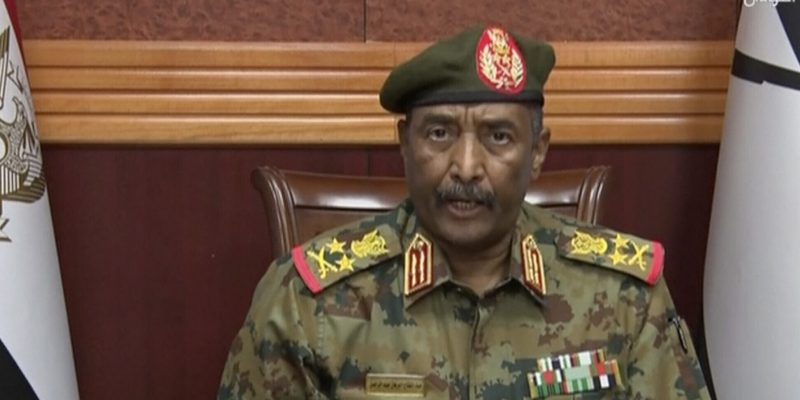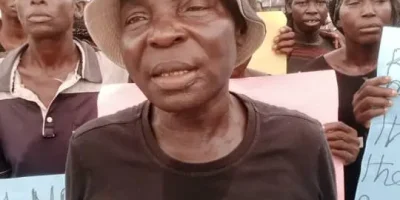The putsch by the Sudanese military has now fully unraveled after it announced the dissolution of the transitional government, headed by prime minister Abdallah Hamdok.
Soldiers arrested most of the members of Sudan’s cabinet in massive dawn raid early on Monday, triggering street protests by the people.
Gunfire and injuries were reported.
Abdel Fattah al-Burhan, a general who headed the Sovereign Council, a power-sharing ruling body, announced a state of emergency across the country.
He was also the one who dissolved the council and the transitional government.
Prime Minister Abdalla Hamdok was detained and moved to an undisclosed location after refusing to issue a statement in support of the coup, said the information ministry, still apparently under the control of Hamdok’s supporters.
The ministry called for resistance against the coup. It said tens of thousands of people opposed to the takeover had taken to the streets and had faced gunfire near the military’s headquarters in the capital Khartoum.
At least 12 people were injured in clashes, a doctors’ committee said on its Facebook page, without providing further details.
The director of Hamdok’s office, Adam Hereika, told Reuters that the military had mounted its takeover despite “positive movements” towards an agreement with Hamdok, following meetings with a visiting U.S. special envoy, Jeffrey Feltman.
A Reuters journalist in Khartoum saw joint forces from the military and from the powerful, paramilitary Rapid Support Forces stationed in the streets of Khartoum.
They restricted civilians’ movements, as protesters carrying the national flag burnt tires in different parts of the city.
The information ministry said military forces had arrested civilian members of the Sovereign Council and members of the government.
In a statement sent to Reuters, it called on Sudanese “to block the military’s movements to block the democratic transition”.
“We raise our voices loudly to reject this coup attempt,” it said.
Sudan had been on edge since a failed coup plot last month unleashed recriminations between military and civilian groups, who have been sharing power following the toppling of long-serving ruler Omar al-Bashir two years ago. read more
Since Bashir was brought down by street protests, a political transition has seen Sudan emerge from international isolation under Bashir’s nearly three-decade rule.
Elections were to be held by the end of 2023.
The military was meant to pass leadership of the joint Sovereign Council to a civilian figure in the coming months.
But transitional authorities had struggled to move forward on issues including whether to hand Bashir over to the International Criminal Court, where he is wanted for war crimes.
In recent weeks, civilian officials had claimed credit for some tentative signs of economic stabilisation after a sharp devaluation of the currency and the lifting of fuel subsidies.
Feltman, the U.S. special envoy who was visiting Sudan on Saturday and Sunday, tweeted that the United States was deeply alarmed at reports of a military takeover, which would put U.S. aid at risk.
The United Nations, Arab League and African Union all expressed concern. Sudan’s political leaders should be released and human rights respected, the AU Commission Chair Moussa Faki Mahamat said in a statement, calling for talks to resume between the military and civilian wings of the transitional government.
Aside from the political tension, Sudan is in the midst of a deep economic crisis, marked by record high inflation and shortages of basic goods, beginning to show signs of easing amid flows of international aid. Western states have warned that any military takeover would put that financial assistance at risk.
Military forces stormed Sudanese Radio and Television headquarters in Omdurman, the twin city of Khartoum, and arrested employees, the information ministry said on its Facebook page.
Two major political parties, the Umma and the Sudanese Congress, condemned what they called a coup and the campaign of arrests.
The internet appeared to be down in Khartoum. Al-Arabiya reported the airport was shut and international flights suspended.
Hamdok is an economist and former senior U.N. official who was appointed as a technocratic prime minister in 2019 and is well respected internationally.
Though popular with pro-democracy civilian groups, he has struggled to keep the transition going due to political splits between the military and civilians and the pressures of the economic crisis.
Family sources told Reuters that military forces had stormed the house of Hamdok’s media adviser and arrested him.
Many of the ministers and officials who had been arrested had been intensifying their rhetoric towards the military in the past few weeks.
The Sudanese Professionals Association, a main activist coalition in the uprising against Bashir, called on supporters to mobilise after what it called the arrest of cabinet members.
“We urge the masses to go out on the streets and occupy them, close all roads with barricades, stage a general labour strike, and not to cooperate with the putschists and use civil disobedience to confront them,” the group said in a statement on Facebook.
As tensions built this month, a coalition of rebel groups and political parties aligned themselves with the military and called on it to dissolve the civilian government, staging a sit-in outside the presidential palace.
Last week, several cabinet ministers took part in big protests in several parts of Khartoum and other cities against the prospect of military rule.
Meanwhile, the Nigerian Government has condemned the military coup in Sudan and called for the immediate restoration of civil rule and release of the ousted Prime Minister and all other political prisoners detained by the soldiers.
The statement signed by the Spokesperson of the Ministry of Foreign Affairs, Esther Sunsuwa, reads: “The Ministry of Foreign Affairs of the Federal Republic of Nigeria strongly condemns the coup d’etat that has taken place today in Sudan, in which the military has dissolved the civilian component of the transitional government and arrested its leaders.
“The Ministry of Foreign Affairs calls for the immediate release of the Prime Minister and all other political prisoners and an immediate restoration of the transitional government and implementation of the agreed roadmap to return the country to constitutional democracy.”








Comments